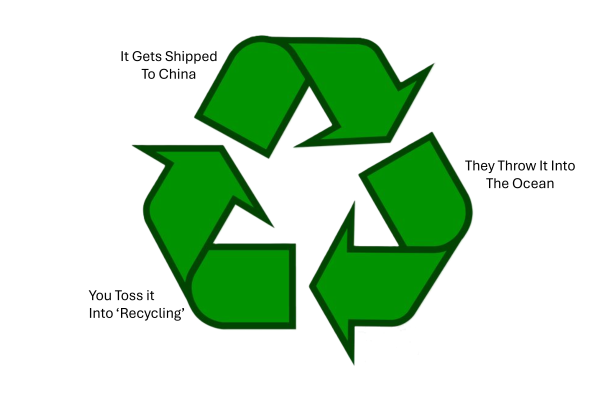The New Republic was gobsmacked by a 2022 report that claimed only 5-6% of plastics entering the recycling stream in America were actually recycled. Most of them are relocated until they end up in landfills, incinerated, or in a turtle’s nose photo-op.
We should blame Big Oil.
Among the biggest plastics producers in the U.S. are ExxonMobil and Shell. Shell opened a giant petrochemical plant in Beaver County, Pennsylvania, in 2022. On the company’s fourth-quarter earnings call, it admitted that costs for the project had soared 130 percent past the original estimates. An investigation by the Pittsburgh Post-Gazette found that, in the first year of the plant’s operations, its polyethylene units—which convert ethylene into tiny plastic beads—were shuttered as often as they were operational. Shell announced this week that it would be pulling out of talks to build a new petrochemicals plant in Basra, Iraq, having said it’ll cut down on “mega projects” like the Beaver County facility.
The gig is up. Thirty years of knowing that recycling was just a lie to protect the plastics industry has been exposed. The petrochemical cat is out of the single-use thin film bag. We have you where we want you. Except you don’t.
Recycling hasn’t worked for years, not just for plastics. Considering all the moving parts and processes, it is cheaper and less carbon-intensive to use new and bury or burn the old.
And that island of floating plastic bobbing about in the ocean that no one can find is a byproduct of recycling. Much like all the other bad things happening to the planet, most come from Asia, where a lot of America’s recycling has traditionally ended its life cycle. In other words, it would be better for the oceans if we buried or burned it, but the New Republic’s author never goes there.
Incinerators are notoriously bad, says the Climate Cult, but we have a better chance of using them to generate electricity and finding stack scrubbing technology to pull out impurities in the exhaust than we ever had of making recycling a lower carbon footprint endeavor.
Then there’s the biggest question of all. If plastics are not or cannot be recycled (even if it makes economic and emissions sense), what do we replace them with? Wood, cardboard, glass, or metal.
Any guesses as to how much more carbon-intensive those are than plastics individually or in total? Manufacturing, transportation of raw material and finished product (they weigh a lot more), and what about disposal? You can recycle cardboard, some glass, and metal, but the post-consumer process is an emissions bitch and not at all cost-effective, so most of that will end up in landfills, too.
And if you thought reusable shopping bags were carbon-intensive (or more likely didn’t know or pretended it was a conspiracy theory, just like how recycling was a lie), wait until they can’t make them with petrochemicals.
You can talk about environmental injustice until the genetically modified lab meat cows come home. This transition will make everything more expensive, which, the last time I checked, was precisely what the Climate Cult wants. If people can’t afford it, they use less, which aligns nicely with the left’s admission that this is what they want and the reality that they’ve made things like food, electricity, and water exponentially more pricey as a matter of policy.
The real problem, aside from an unhealthy obsession with hating big oil and affordable living, is that they hate you. People are the biggest problem, and it’s one the globalists have been working on. What do you think Medically Assisted dying is all about? They make you miserable, convince you that death is what’s best for the community, and then recycle your organs into elites whom they are convinced will do more with them than you ever could.
And you can’t do the transplants without a lot of unrecyclable single-use plastics (medical waste), so the New Republic is either yanking their chain or yanking their own. You decide which.
